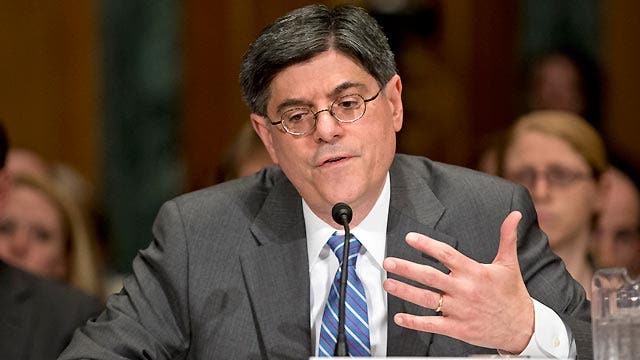Jack Lew questioned about personal finances on the Hill
Inside treasury secretary nominee's confirmation hearing
Treasury secretary nominee Jack Lew was challenged Wednesday over a nearly $1 million bonus he accepted from Citigroup just as the company was getting bailed out by the government, at an at-times tense confirmation hearing on the Hill.
Lew, who previously served as White House chief of staff and budget director, faced questions on the Senate Finance Committee a day after another President Obama nominee -- Pentagon pick Chuck Hagel -- narrowly advanced out of committee on a strict party-line vote. While not facing quite the level of scrutiny as Hagel, Lew was pressed on everything from his investments to his budget approach to his time at Citigroup.
Republican lawmakers pointedly asked him how he could accept a $940,000 bonus from Citigroup in early 2009. At the time, Citigroup had received a $45 billion bailout and was about to get an even bigger federal guarantee.
Citigroup ultimately paid the money back, plus an additional $13 billion, and never had to rely on the guarantee.
Sen. Chuck Grassley, R-Iowa, questioned why Lew thought it to be "morally acceptable" to take the money from an "insolvent" company receiving federal aid.
Lew said he was compensated in a manner consistent with how other employees were paid.
But Sen. Orrin Hatch, R-Utah, top Republican on the Senate Finance Committee, said Lew's explanation "seems just a little bit to me like saying 'gee, Dad, everyone was doing it.'"
"Unfortunately that type of reasoning is exactly what led to this financial crisis," Hatch said.
But Lew again said his compensation was "comparable" to that for employees in similar positions. He said he helped reduce costs for Citigroup by shedding certain parts of the operation and real estate. Before the bonus, Lew said his base salary was $350,000.
The nominee generally pitched himself during the hearing as a work-across-the-aisle technician committed to boosting the economy and reining in the budget deficit.
"Forging bipartisan consensus is not an abstract idea for me," he said.
Democrats have few qualms about Lew's nomination, and roundly praised him Wednesday as a hard-working, honest and skilled member of the president's team well-suited to the vital job of Treasury secretary.
"There is no straighter shooter than Jack Lew," Sen. Charles Schumer, D-N.Y., said, introducing the nominee. He noted that the last time the federal government notched a surplus was when Lew served at the budget office under then-President Bill Clinton.
But Republicans set about to grilling the nominee, whom some GOP lawmakers see as a driver behind Obama's deficit-heavy budgets.
Hatch, also referring to Lew's Citigroup time, cited a potential "awkward situation" -- Lew has said he supports the Volcker Rule (which separates proprietary trading from federally insured financial activities), but at Citigroup Hatch said he oversaw units that engaged in activities that the Volcker rule is meant to prevent. Hatch warned that as chair of the Financial Stability Oversight Council Lew would be saying "do as I say, not as I did."
Sen. Jeff Sessions, R-Ala., earlier accused Lew of "deliberate" deception, saying statements Lew made while serving as director of the Office of Management and Budget should disqualify him from the position.
In a letter to his fellow senators obtained by Fox News the day before Lew's Senate confirmation hearing, Sessions argued Lew's assertions were "so false and outrageous as to disqualify him from serving as Secretary of the Treasury."
In 2011, Sessions says Lew repeatedly asserted that a budget proposal he had authored would lead to a decrease in the national debt, and that the government would no longer be adding to the debt annually.
However, in actuality he said the proposal would have increased the gross debt of the United States by $13 trillion, the smallest annual deficit would have been $607 billion, and by the last year of the budget the deficit would have grown to nearly $1 trillion.
"OMB Director Lew looked the American people in the eye and, without any qualification, made what is surely the greatest financial misrepresentation in history," Sessions wrote.
Sessions said Lew's statements were "not error or puffing," asserting they were "deliberate artifice" to deceive the public. Sessions also expressed concerns over what he calls Lew's level of experience, and his time at Citigroup.
Lawmakers also questioned Lew on a $56,000 investment Lew used to have in a fund registered in the Cayman Islands.
Lew acknowledged the investment but said he "didn't know at the time what the address of the partnership was." Asked whether he paid taxes on the fund, he said he actually "lost money on the investment."
The Treasury job isn't quite as perilous as the one that greeted Timothy Geithner, who had to help stabilize the U.S. banking system after the worst financial crisis since the 1930s and help lift the economy out of the Great Recession.
The economy and banking system are far healthier now. Still, Lew will likely have to marshal all his strengths as a budget specialist and perhaps overcome inexperience in some areas to achieve significant success.
Lew, 57, has twice served as a White House budget director -- once during the Clinton administration and once under Obama before becoming his chief of staff.
Going back to his days as an aide to House Speaker Tip O'Neill in the early 1980s, Lew has amassed three decades of experience at the top levels of Washington policy-making.
After Wednesday's hearing, committee members will have two days to send questions to Lew to answer before they vote. The full Senate could vote on the nomination late this month.
That would give Lew little time before his first budget challenge -- the March 1 date when deep spending cuts in defense and domestic programs will kick in unless Congress and the administration agree on some way to avert them.
Fox News' Chad Pergram and The Associated Press contributed to this report.













































